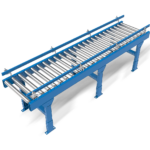In today’s fast-paced and interconnected world, the logistics industry plays a crucial role in ensuring the smooth flow of goods and services across the globe. However, the complexity of managing intricate supply chains and meeting ever-increasing customer demands necessitates a constant quest for improvement. This is where automation emerges as a transformative force, revolutionising the landscape of logistics and driving significant advancements in efficiency, accuracy, and cost-effectiveness.
Enhanced Efficiency
One of the most compelling arguments for automation in logistics lies in its ability to drastically improve operational efficiency. Repetitive tasks, such as picking and packing, are traditionally labor-intensive and prone to human error. Automation removes these burdens from human workers, allowing them to focus on more strategic and value-added activities. This not only increases throughput and productivity but also ensures consistent accuracy, minimising errors and delays.
RELATED: The Impact of Logistics Automation on Australia
Improved Inventory Management
Modern automated systems offer unparalleled real-time visibility and control over inventory levels and locations. This allows businesses to optimise storage space, reduce stockouts, and expedite order fulfillment times. The enhanced visibility also facilitates better forecasting and demand planning, leading to more efficient resource allocation and significant cost savings.
Reduced Operational Costs
The implementation of automation has the potential to significantly reduce operational costs across various aspects of the logistics chain. The automation of routine tasks minimises reliance on manual labor, resulting in lower labor costs. Additionally, automated systems can optimise energy consumption and reduce waste, leading to further cost savings and contributing to a more sustainable business model.
Enhanced Accuracy and Reduced Errors
Automated systems are designed to function with precision and consistency, significantly reducing the risk of human error. This is particularly beneficial in critical areas like picking and packing, where even small errors can lead to incorrect orders, dissatisfied customers, and costly returns.
Increased Safety
The integration of automation into warehouse operations can significantly improve safety by removing human workers from potentially hazardous environments. Automated machines are adept at handling heavy loads and operating in dangerous conditions, safeguarding workers from injuries and accidents.
24/7 Operations
Automated systems offer the advantage of round-the-clock operation, enabling businesses to fulfill orders and deliver goods continuously. This increased uptime leads to faster delivery times, improved responsiveness to customer needs, and ultimately, enhanced customer satisfaction.
Real-time Visibility and Tracking
Automation provides real-time visibility into the movement of goods throughout the supply chain. Businesses can track the location and status of their shipments in real-time, enabling them to proactively address any potential issues, anticipate delays, and make informed decisions regarding inventory and transportation resources.
Improved Customer Experience
The adoption of automation can significantly enhance the customer experience by ensuring faster, more accurate, and reliable deliveries. Customers benefit from real-time order tracking and updates, fostering trust and transparency within the customer-business relationship. This ultimately leads to increased customer satisfaction and brand loyalty.
Sustainability and Environmental Benefits
The implementation of automation can contribute to a more sustainable logistics industry by reducing emissions and waste. Automated systems can optimise routes and fuel consumption, leading to lower carbon emissions and a reduced environmental footprint. Additionally, automated warehouses can utilise energy-efficient technologies, further minimising their environmental impact and aligning with corporate sustainability goals.
RELATED: Embracing the Future: Logistics Automation Solutions Unveiled
The Future of Logistics
As technology continues to evolve, the role of automation in logistics is expected to expand exponentially. We can expect to see more sophisticated robots, AI-powered systems, and smart warehouses that further optimise the flow of goods and revolutionise the industry. However, it’s crucial to acknowledge that automation is not without its challenges. The implementation of these technologies requires significant investments and can lead to job displacement in certain areas. Companies must carefully consider the potential social and economic implications of automation and ensure a smooth transition for affected workers through reskilling and training initiatives.
In conclusion, automation is demonstrably transforming the landscape of logistics, offering a multitude of benefits that enhance efficiency, accuracy, reduce costs, and improve the overall customer experience. As technology continues to advance, automation will undoubtedly play a key role in shaping the future of logistics, creating a more efficient, sustainable, and customer-centric industry. It is essential for businesses to embrace this transformative force and strategically integrate automation solutions to remain competitive and thrive in the dynamic and demanding world of logistics.
Empower your logistics with SmartlogitecX, fueled by WayZim Technologies. As leaders in Warehouse Automation for the Australian market, we’re dedicated to delivering efficiency and innovation right to your doorstep. SmartlogitecX’s approach is two-fold: globally informed, locally applied. Take the first step towards optimised operations by reaching out to our sales team for a solution that speaks directly to your needs.



